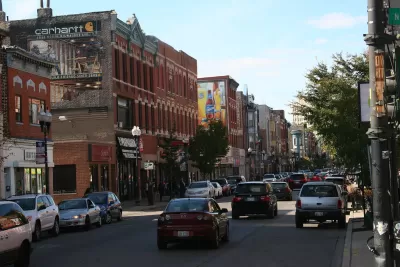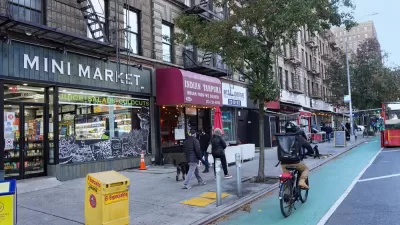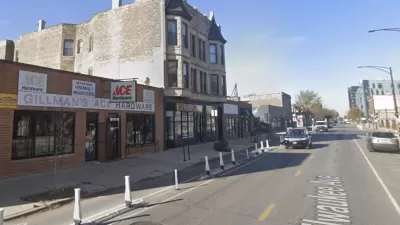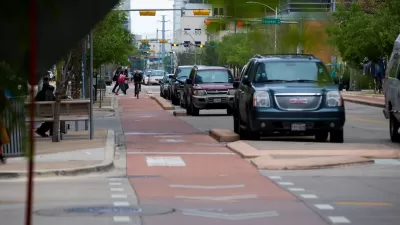With car parking banned from two blocks of Chicago's Milwaukee Avenue on weekend nights, the city could take the opportunity to permanently adapt the space for other uses.

After complaints from neighbors about illegal street drinking and after-hours noise on a popular strip of Chicago's Wicker Park neighborhood, the city banned parking on the 1400 and 1500 blocks of Milwaukee Avenue on weekend nights. But now, as John Greenfield reports, some business owners say "not only do empty parking lanes make the corridor look more desolate, they also encourage motorists to speed in the travel lanes, or even drive in the parking lanes, which is particularly dangerous for people cycling in the dashed bike lanes on Milwaukee."
Greenfield argues that the city should do more to support the retrofitting of curbside parking into outdoor seating and dining areas, and that these efforts should include shoring up bus service in popular commercial areas and installing protected bike lanes in former parking lanes.
While some local business owners expressed concern about losing parking when a protected bike lane was first proposed in 2017, Greenfield writes that "it sounds like removing all of the car parking on Milwaukee during prime bar-going hours hasn’t actually been devastating to local businesses, but instead has been a minor inconvenience. That’s evidence that converting only half of the spaces for protected lanes at all times wouldn’t cause major problems either, but would instead make it safer and easier for customers to bike to their establishments."
FULL STORY: Banning parking as a public safety strategy? Use the space for walking, biking, or dining

Planetizen Federal Action Tracker
A weekly monitor of how Trump’s orders and actions are impacting planners and planning in America.

Restaurant Patios Were a Pandemic Win — Why Were They so Hard to Keep?
Social distancing requirements and changes in travel patterns prompted cities to pilot new uses for street and sidewalk space. Then it got complicated.

Maui's Vacation Rental Debate Turns Ugly
Verbal attacks, misinformation campaigns and fistfights plague a high-stakes debate to convert thousands of vacation rentals into long-term housing.

In California Battle of Housing vs. Environment, Housing Just Won
A new state law significantly limits the power of CEQA, an environmental review law that served as a powerful tool for blocking new development.

Boulder Eliminates Parking Minimums Citywide
Officials estimate the cost of building a single underground parking space at up to $100,000.

Orange County, Florida Adopts Largest US “Sprawl Repair” Code
The ‘Orange Code’ seeks to rectify decades of sprawl-inducing, car-oriented development.
Urban Design for Planners 1: Software Tools
This six-course series explores essential urban design concepts using open source software and equips planners with the tools they need to participate fully in the urban design process.
Planning for Universal Design
Learn the tools for implementing Universal Design in planning regulations.
Heyer Gruel & Associates PA
JM Goldson LLC
Custer County Colorado
City of Camden Redevelopment Agency
City of Astoria
Transportation Research & Education Center (TREC) at Portland State University
Camden Redevelopment Agency
City of Claremont
Municipality of Princeton (NJ)





























